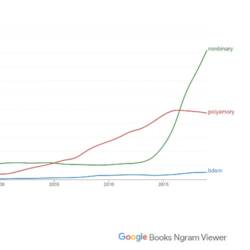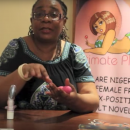Let’s Talk About Mental Health and Avoid a Touch-phobic Future
How will prolonged global lockdowns affect human sexuality in the future?

Famed Nobel Prize-winning physicist Nils Bohr said it best: “Prediction is very difficult, especially if it’s about the future.”
Difficult or not, that has never stopped speculation about what lies ahead from yours truly and countless others. Top of mind in our now-virtually touchless world is how prolonged social isolation of large global populations may affect human sexuality in the years to come.
One hypothesis is when we can finally fly open our doors to escape from social isolation, the world will erupt in a metaphorical—and maybe even literal—orgy to catch up on lost time.
On the contrary, the opposite viewpoint also exists. Rather than a sweaty and sexy celebration kicking off at the end of the pandemic, we’ll have a world where for some people physical contact, sexual or otherwise, could be unpleasant—or even frightening.
The pandemic mental health crisis

Before getting into the psychological mechanisms behind this potential touch-phobic future, it’s essential to set the stage by showcasing how significantly COVID-19 affects people’s mental health.
In a poll conducted by the American Psychiatric Association in March, 48% of respondents reported anxiety about contracting the virus. This figure rose to 62% when asked about their concern over family or loved ones falling ill, resulting in severe mental issues, including anxiety attacks, and depression.
Worse still, due to quarantine restrictions, many are cut off from what they need most: the ablility to touch—and be touched—by another human being.
Previously, we looked at how this deprivation of touch has led to an increase in sexbot purchases. Though a compelling solution, and well worth exploring for some, it may not be a suitable option for others. In essence, it may all boil down to whether or not plastic feels lifelike or not to you.
Acknowledging this a far-too-simplistic view of an complex psychological situation, when cut off from something they need or want, human beings will either increase their longing or, conversely, flip it entirely around: turning it from philia to phobia.

In an article on how this is happening, Bruce Bolster, associate professor of psychology and coordinator of the University of Winnipeg’s neuroscience program, told CDC, “I think the fear, the anxiety, the concern, the paranoia is going to persist for quite some time.”
Voicing a little optimism about where this might lead, McGill University clinical psychology Ph.D. candidate Danielle Rice added that post-pandemic, “I think there will be definitely some hesitation for handshakes and hugs and these types of greetings that we’re quite used to.”
RELATED READ: Lonely Lovers Are Turning to Sex Dolls to Satisfy Their Pandemic ‘Skin Hunger’
There’s also that, given enough time, humans can get used to practically anything—including avoiding human contact.
We’re already seeing a great deal of this new-normal, with businesses successfully transitioning over to telecommuting, and the move away from public entertainment—like movie theaters—to completely at-home experiences.
Dating, too, has transitioned from a few quick chats leading to a first, in-person-date, to creating, nurturing, maintaining, and sexually fulfilling relationships without a single touch.
Not to mention the repeatedly noted boom in sextech sales that’s propelled teledildonics from fringe fun to mainstream sexual activities, Zoom hosting virtual orgies, strippers going virtual, and sexworkers either leaving in-person contact behind or no longer accepting skin-on-skin services.
Taking all these changes to mind, it’s not far-fetched that for some social isolation will go from enforced to preferred.
The way things could be

Before saying anything else, back to Bohr and speculating about how anything is going to be right now is flat-out impossible.
Sure it’s entertaining and—as we’ll get to in a moment—even critical to do but not when it does nothing but add to our already-maxed out stress-levels.
Agreed, humans often react oddly to certain situations, including mentally twisting and turning things around. But while there will undoubtedly be a few coming out of the other side of the pandemic with cases of haphephobia—the technical term for touch-phobia—that doesn’t necessarily mean it’ll be anywhere close to a culturally systemic problem.
We could very well see streets packed with sexual revelers after COVID-19 is no longer such a threat: spontaneous sex parties, kinky revels, hedonistic bacchanalias and more spontaneously erupting at the drop of a hat—or any item of clothing for that matter.
But as there is no generalization for human behavior, there could similarly be those who’ve found happiness and virtual sexual satisfaction—while staying safely at home.
The big question then becomes one of consent.
If avoiding human contact gives people pleasure, and is made consciously rather than as a form of stress-induced aversion, then no one should try and change it.
Who knows, maybe it’ll develop into a new sexual orientation—or provide a new upswell in popularity for already-existing ones like technofetishism?
In some ways, this is already here. While in the West, otaku has been co-opted to mean a major fan of something, in its native Japan there’s a subset to this subculture that adds a desire for social isolation as well.
It’s also telling that though a long-time pejorative, self-identifying okatu have begun proudly reclaiming the term–with or without the isolation aspect.
So while we’ve tapped the alarm bell a few times here is there any real reason to dread what’s around the corner in regards to touch, technology, and sex?
Change is inevitable—and wonderful

With all our fantasies about wanting things to go back to the way they were, we often forget that no matter how bleak things got in the past, after the dust settled the world has been irrevocably altered.
Like it or not, scary or not, society moves forward, leaving some things behind while picking up new ways to live and love and hopefully learning from our mistakes.
Bohr was right: there’s no point in speculating what-could-be. Partially that it’s never accurate but also unavoidable.
Not that we should take our hands off the wheel. Rather we should use this time to thoroughly examine ourselves as a species. Including how we interact with the environment, that we’ve allowed intolerance and inequality to run rampant, and—what we’re all here for—the future of human sexuality.
Right along with those flash mob orgies and those preferring their erotic pleasures to be contact-less, we might see a mix and melding of that and far more: a beautifully, gloriously world packed with sexual options and erotic pleasures—all because we finally accepted there’s no going back, only forward.
Difficult or impossible, as predictions might be, let’s envision of kind of world, for as Freeman Dyson, another eminent science said, “The purpose of thinking about the future is not to predict it but to raise people’s hopes.”
Image sources: Cityswift, Sodanie Chea, Ivan Radic, Alfred Grupstra, Marcus Hansson

















